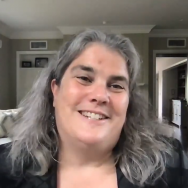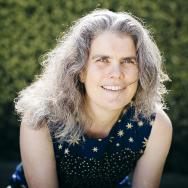Astrophysicist Andrea Ghez was awarded the 2020 Nobel Prize in Physics for discovering the supermassive black hole that lurks at the center of the Milky Way.
Ghez led a team that carefully measured the movements of stars at the center of the Milky Way, showing that these stars were revolving around something incredibly heavy. That black hole, named Sagittarius A*, is thought to have played an important role in the formation of our galaxy. She also developed a technique known as speckle imaging, which combines many short exposures from a telescope into a single, crisper image.
A professor at the University of California, Los Angeles, Ghez grew up in Chicago and is a 1983 graduate of the University of Chicago Laboratory Schools, an N-12 school renowned for its pioneering approach to education. Last month, she gave a colloquium at the UChicago physics department explaining how to prove a black hole exists.
Ahead of the Nobel Prize award ceremony on Dec. 10, she spoke with UChicago News about her love of science, how to get back up again after running into obstacles in life, and the responsibilities that come with winning science’s top honor.
“You become a spokesperson for science,” she said. “With being the fourth woman ever awarded in physics, there’s an opportunity there to be a more visible role model. How do you want to use that opportunity to advance science—your science, science at large, and the opportunities for the next generation to do science. So I’m still thinking a lot about that.”
The full interview, edited for clarity, is below.
You’ve had a long career in science—what kept you going?
I love it! I think it’s all about what you love. You can endure a lot if you have passion for something.
Anything you do with great intensity comes with all kinds of interesting issues. In both science and life, you’re going to experience—I’m looking for a different word than failure, because it’s not really failure. It’s bumps in the road. It’s things not going how you planned or thought, and how to develop that ability to understand the idea that all challenges can be opportunities.
I have to say, that’s become one of my favorite sayings—that all challenges can also be opportunities. When I talk to my kids, I say that good faceplants are really important in life. You need to figure out how to get up and figure out what didn’t work, and how you move forward. How do you take whatever you can learn from it, and just keep going? Because that always happens. It doesn’t matter what field you’re in. It doesn’t matter what walk of life you’re from. These things will present as challenges; how do you reposition yourself so that you can make progress?
What’s an example of a challenge that became an opportunity for you?
Well, you know, the first time I proposed to do this [now Nobel-winning] experiment to get telescope time, it was turned down. To me, it was so obvious that it was such a good idea! I realized when you’re trying to convince a group of people to do something that hasn’t been done before, just because you think it’s a good idea, that doesn’t mean they’re going to accept it.
So it forced me to articulate the science better. That’s the opportunity: Figure out what they didn’t like and strengthen the argument.
The most interesting moments scientifically are when you talk to somebody with a really different point of view. Often you can find deeper truths, or the weaknesses in work, by having dialogues. In fact, that’s why I like giving talks about my work at other universities, because you present it to different audiences and they often have something new to offer, or something you didn’t think of.
How do you feel your field has changed since you started?
Astronomy and astrophysics have changed a tremendous amount over the last two decades—I think primarily because it’s a field that benefits from technological development. We have so many new ways of seeing the universe, some of which have radically changed even the things we used to teach in intro courses.
We didn’t know about planets outside our own solar system or gravitational waves. And of course, the center of the Milky Way has been super exciting because we’ve been able to open up new ways of seeing the center of the galaxy, [which in turn] opens up these new questions that you didn’t even think to ask at the outset of the project.
So I find that really exciting. Sometimes people ask me, ‘Why are you still in this field?’ Because we’re not done yet!
How did your experience at the UChicago Laboratory Schools shape your thinking about science?
I had a great experience at the Lab School. The older I get, the more I appreciate the education I got there, from all different points of view. Their approach was teaching kids how to learn—how to ask questions, rather than how to learn facts. And that really greatly informs how I think today, because I think basic research is so much about figuring the right question.
I also really appreciated growing up in Hyde Park with kids with all different backgrounds. That’s so valuable, to be able to start your life off with thinking that’s normal.
What is the biggest challenge for science right now?
The biggest challenge for science right now is that we’re in this moment where the very underpinnings of the concepts of truth or fact are being challenged. I think that makes science all the more important to talk about.
What did you think about when writing your speech for the Nobel ceremony?
I thought about it as an opportunity to be grateful—to be grateful for what enabled the work, from an early teacher point of view, early mentors, institutional, funders, collaborators.
How did you feel when you got the call?
I have to say, I just couldn’t believe it. I was amazed. It’s an interesting thing. It’s a delightful thing to have been awarded, but it’s something that you just can’t work towards, because you’re going to be disappointed. So I think I’ve worked really hard to focus on the science, as opposed to recognition. So I’m thrilled. Hopefully that’s not contradictory.
Has your thinking about it changed at all since getting the award?
I guess what I’ve thought mostly about is the responsibility of the award. So what does it mean, what does it change? There are a lot of opportunities that come with this, so you have to decide again—which ones are you going to take up. It comes back to, what is it that you want to do next, what is important for you to do next.
Every opportunity comes with privilege and responsibility. I really take that seriously.
What do you see as those responsibilities?
You become a spokesperson for science. With being the fourth woman ever awarded in physics, there’s an opportunity there to be a more visible role model. How do you want to use that opportunity to advance science—your science, science at large, and the opportunities for the next generation to do science. So I’m still thinking a lot about that.
Any advice for young scientists?
My advice is try to figure out what you’re really excited about. And never forget to keep exploring, because you never know what you’re going to enjoy before you try it. So for me, I really didn’t want to teach because I was so terrified of public speaking. When I got to Caltech and I had to give my first lunchtime talk [as a graduate student], I shook from head to toe—but my advisor said you have to teach. But I discovered I loved it. I got over my fear and ended up understanding that I had a real passion for teaching.
So my advice is both identify what floats your boat, but keep taking risks to understand how to expand or evolve. Because we keep evolving. You’re continuously in this state of figuring out how you can contribute in an interesting and meaningful way, both in terms of the impact you have and also the fulfillment you feel from doing it. The advice is to keep thinking about that. Don’t get stuck.

